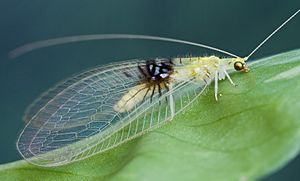Serendipity facts for kids
Serendipity is when you find something cool or useful by accident, without even looking for it! It's like a happy surprise discovery. This happens a lot in science and when new things are invented. Sometimes, online tools can even help us have more serendipitous moments by showing us new ideas.
Contents
Where the Word "Serendipity" Comes From
The word "serendipity" was first used in English by a writer named Horace Walpole in 1754. He wrote a letter to a friend about finding a lost painting by accident. He compared it to an old Persian fairy tale called The Three Princes of Serendip. In the story, the princes always found new things by chance and cleverness, even when they weren't looking for them.
The name "Serendip" was an old name for the country we now call Sri Lanka. It came from an ancient Sanskrit word. Today, the word "serendipity" is used in many languages to mean an "unexpected discovery" or a "lucky chance."
How Serendipity Helps Us
Amazing Inventions by Chance
Many everyday things we use were invented by accident! For example, some people think that cheese was first made when ancient travelers stored milk in a camel's stomach. The natural chemicals in the stomach mixed with the milk, turning it into cheese.
Here are some other cool inventions that happened by chance:
- The Post-it Note: A scientist made a weak glue by mistake. Later, a friend used it to keep bookmarks in his church songbook.
- Silly Putty: This fun toy was created when someone was trying to make a new type of rubber.
- The microwave oven: A scientist named Percy Spencer noticed that radar equipment melted the candy in his pocket. This gave him the idea for the microwave!
- Velcro: George de Mestral got the idea for Velcro after a hunting trip. He saw how tiny burrs stuck to his pants and realized they had tiny hooks.
- The Popsicle: An 11-year-old boy named Frank Epperson accidentally left a mix of water and soda powder outside overnight. It froze, and the Popsicle was born!
- Penicillin: The famous antibiotic was discovered by Alexander Fleming. He came back from vacation and found that mold had grown in one of his dishes, killing the bacteria around it.
Surprising Discoveries
Serendipity also helps with new discoveries. An insect expert named Shaun Winterton found a new species of lacewing called Semachrysa jade. He didn't find it in its home country of Malaysia, but on the photo website Flickr!
Flickr helped him because it showed him pictures that matched his interests. This made it more likely he would stumble upon the photo. Some computer scientists say that getting information that is "just a little bit new" helps us understand it better.
Serendipity Online
Imagine if websites could show you new ideas you weren't even looking for! This is called "architecture of serendipity." It means designing online spaces to help you find different opinions and information.
A professor named Cass Sunstein believes this kind of design could make our democracy stronger. Just like a big city or a university, a good online space should show you new ideas and ways of thinking. He says, "Serendipity is important because it makes you think bigger. You need that to be truly free." This idea could be used to design social media, search engines, and web browsers.
Related Terms
Sometimes, things go wrong by accident.
- Zemblanity is the opposite of serendipity. It means making unhappy or unlucky discoveries that you didn't expect.
- Bahramdipity is when powerful people stop good discoveries from being shared. This term also comes from The Three Princes of Serendip.
See also
 In Spanish: Serendipia para niños
In Spanish: Serendipia para niños
 | Selma Burke |
 | Pauline Powell Burns |
 | Frederick J. Brown |
 | Robert Blackburn |







